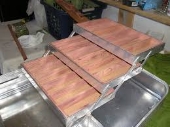
 5
5




All true wealth is biological.
Lois McMaster Bujold
 5
5




 2
2





 1
1




Some places need to be wild
 4
4




Dian Green wrote:We need to upgrade our electric panel from a 100amp, 80's one to a 200 new one. Not dire, but it needs to happen. I have been thinking about solar and was leaning towards waiting another couple of years since the roof is old enough that it'll probably be best to just put in a metal one under the solar.
I am now thinking its best not to wait too long. If we go ahead with the solar, should I wait on the panel and just have it all done together? I just don't want to have to have anything done twice.
Also would welcome any recommendations for solar installers in southern Ontario. ( between London and Hamilton)




All true wealth is biological.
Lois McMaster Bujold




Eric Hanson wrote:
Now I don’t understand the full context and perhaps Michael can explain this better, but where I live, we can trade extra solar power back to the power company to offset power purchased during night, etc. I assume that this means power is running away from the house, but I am certainly open to correction.
Eric

|
I didn't say it. I'm just telling you what this tiny ad said.
Learn Permaculture through a little hard work
https://wheaton-labs.com/bootcamp
|




